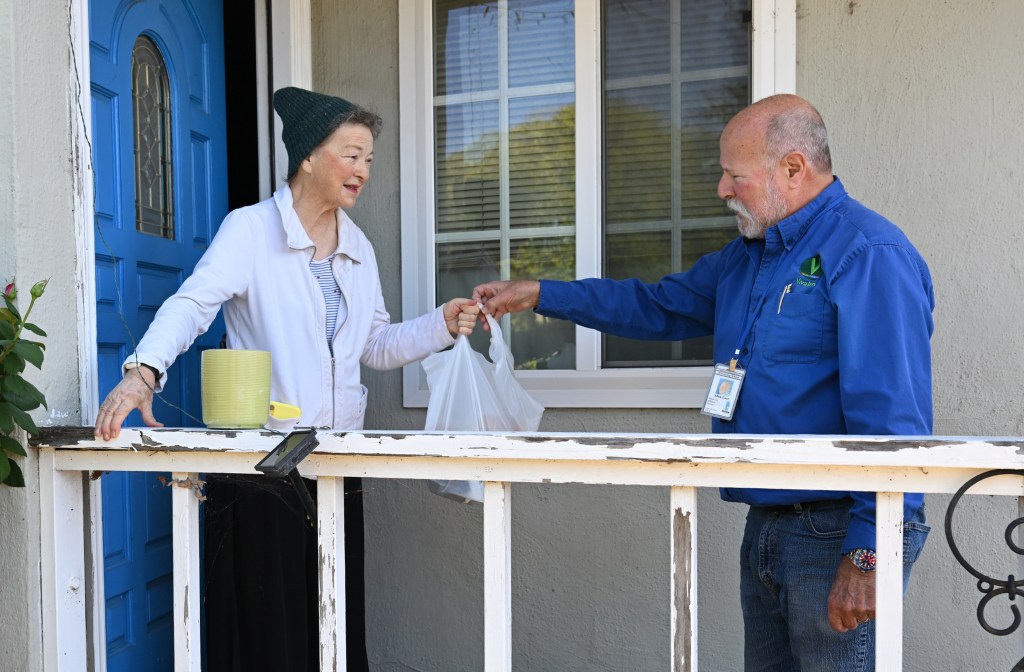Novato resident Meredith Burns receives a bag of prepared meals from Meals on Wheels delivery driver Allen Ruth at her home in Novato, Calif., on Friday, May 31, 2024. (Shelly Lubbers/Marin Independent Journal)
The number of Marin County seniors receiving food assistance is growing, and many are worried about whether they will have enough food in the future.
From July 2019 to July 2022, the number of residents age 60 and older participating in the CalFresh program, California’s version of food stamps, increased by about 69% in the county. That number grew from 2,089 in July 2019 to 3,535 in July 2022.
Those numbers stood out when county Social Services Director Kari Buehrman briefed the Board of Supervisors last month on the county’s participation in CalFresh, saying some seniors are reluctant to accept assistance that would be considered welfare.
“We need to continue to do all we can to break down the stigma that is very real, especially among older populations,” Buehrman said.
Kristi Denton Cohen, the county’s Commissioner on Aging, said it’s an issue that “continues to surprise” people.
“This is hidden poverty that people don’t know about, and it’s especially horrifying for women,” Denton-Cohen said.
The survey, commissioned by the Marin County Health and Human Services Department and conducted in November and December among 412 residents, found growing anxiety among seniors about food and financial security in general.
County supervisors were briefed on the study findings as they approved the county’s Local Aging Agency Plan for 2024-28. Local Aging Agencies are public or private nonprofit organizations designated by the state to address the needs and concerns of older adults at the local and regional levels.
In a survey conducted by Davis Research LLC, 18% of respondents said food insecurity was a concern, up from 10% who expressed the same concern in 2019.
Sixteen percent of respondents said they often or sometimes worry they will run out of food before they receive their money, compared with 10% of respondents in 2019 who expressed similar concerns.
13% said food doesn’t last long and they often or sometimes don’t have money to buy food. In 2019, 7% said they ran out of food.
The survey also found that 29% of respondents were concerned about their overall financial security. In the 2019 survey, 13% of respondents cited financial security as a concern.
“Women are twice as likely to be food insecure as men, 27% vs. 12%, and non-whites are twice as likely to be food insecure as whites, 30% vs. 15%,” Leah Brown, commissioner on aging, said in an email.
Federal and state laws require local aging agencies to develop plans every four years to address the needs of seniors, and Marin’s city supervisors serve as the local AAA’s board of directors.
About 30% of Marin County’s population is over 60, and 7% live below the federal poverty level, earning $14,579 a year or less, according to the 2024-2028 plan approved in May.
29% live below the federal poverty level, which is $44,000 per year for individuals in Marin County and $60,000 per year for couples.
Residents age 60 and older are eligible to receive free home-delivered meals through the county’s Meals on Wheels program, which the county contracts with Vivalon Inc. To qualify, residents must be physically unable to get out and need significant assistance in at least two areas of daily living, based on a county assessment.
Jeney Cottrell, the county’s new senior and adult services director, said Meals on Wheels provided 120,000 meals to 950 people in 2022-23, compared with 97,234 meals to 584 people in 2020-21.
“We saw a big increase in enrollment in the first year of the pandemic,” Cottrell said, “and while we’ve seen some declines in numbers and meals, we’re still at higher levels than we were pre-pandemic.”
Novato resident Meredith Barnes, 74, said the program provides her with three prepared meals a week.
“It’s enough to temporarily stave off having no food at all,” said Barnes, who has been unable to work since a fall two years ago.
“I’m still a little frail, so I use a walker,” she said.
Before the accident, Burns worked for seven years handing out food samples to customers at Costco. She receives about $1,300 a month in Social Security benefits, but said she has to pay $1,025 a month in rent. She rents a room in a house she shares with two others.
Burns said she signed up for CalFresh a few months ago and receives a subsidy of about $230 a month. She also receives fruits and vegetables from Jewish Family and Children’s Services.
Barnes said a social worker from Sutter Health who was sent to help her recover from the fall encouraged her to apply for CalFresh.
“I didn’t know anything about it,” Barnes said, “but she told me about it and helped me apply.”
 Aaron Brown, a volunteer with the San Francisco Marin Food Bank, distributes bunches of cauliflower at a makeshift pantry set up in the parking lot of Pickleweed Park in San Rafael, Calif., on Tuesday, Nov. 7, 2023. (Shelly Lubbers/Marin Independent Journal)
Aaron Brown, a volunteer with the San Francisco Marin Food Bank, distributes bunches of cauliflower at a makeshift pantry set up in the parking lot of Pickleweed Park in San Rafael, Calif., on Tuesday, Nov. 7, 2023. (Shelly Lubbers/Marin Independent Journal)
Source link


